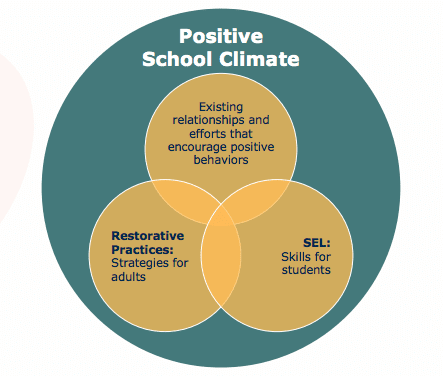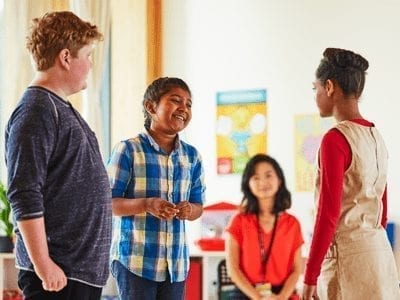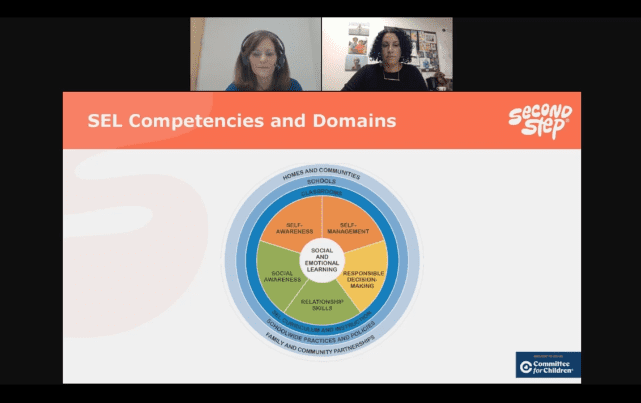Focusing on a Safe, Supportive School Climate
Zero tolerance policies, while trying to keep kids accountable for their actions, often result in suspensions for even minor infractions like dress code violations or being tardy. While these behaviors warrant attention, Fatima Rogers, Principal of Charles W. Henry School, School District of Philadelphia, and Jody Greenblatt, Esq., Deputy of School Climate and Safety, School District of Philadelphia, questioned what their conduct code and other discipline methods actually did to help students. Working with the Committee for Children, they’re piloting a program merging social emotional learning (SEL) and Restorative Practice (RP) in school. Their goal, as explained in the edWebinar, “SEL and Restorative Practices: Schoolwide Integration Strategies,” is to not only give students the emotional toolkit they need but to also provide a behavioral framework that focuses on support over punishment.
During the presentation, Rogers and Greenblatt discussed several keys to successful implementation of SEL and RP.
- Focus on all school relationships. While the main goal is to improve student and staff interaction, they also worked on administration and staff as well as staff-to-staff relationships. By concentrating on relationships at all three levels, the overall school culture benefited.
- An outside coach can offer a new perspective. Truly integrating SEL and RP requires intense work, especially from the staff. Having a third party can provide a fresh take on a school’s progress and objective insights into what is and isn’t working.
- Planning shouldn’t happen overnight. In preparation, the new practices were introduced in stages. First, the staff met the coach and learned more about SEL and restorative practices. Then, after planning meetings with the leadership team, staff spent two of their four summer PD days in training. During the school year they have monthly check-in meetings, and they also do an overall evaluation at the end of the year.

- Make time for SEL. While the RP can be integrated throughout the school week, students need dedicated time for SEL lessons. At Henry, they have SEL lessons every Monday morning with follow up throughout the week.
- Align lessons to school-specific goals. For instance, elementary-age kids might need lessons in empathy and emotion management. Kindergartners who’ve never been in school before might need basic skills for learning. Middle schoolers, though, might work on peer conflict resolution.
- Don’t change the code of conduct in name only. As part of embracing restorative practices, administrators eliminated suspensions for grades K-2 and severely decreased suspendable infractions for the other grades. More important, they removed the old offenses as choices from the school discipline system. This gives teachers no option but to use restorative strategies.
Since the pilot program was initiated in the 2017-18 school year, suspensions at Henry have decreased from 48 in 2016-17 to two so far in 2018-19. In addition, the number of students with 95%+ attendance has increased to 426. But despite the success, the administrators aren’t pulling back on the training. All new teachers have RP in their contracts, and all teacher groups devote at least one meeting a month to RP and SEL.
“We just realized that making certain that the same exact way we professionally develop teachers in literacy, math, social studies, science, and those key areas in school, we also have to provide opportunity to have professional development for social emotional learning and restorative practices,” said Rogers about continual staff training. “We [have] to come together as a staff to meet the needs of the students.”
This edWeb broadcast was sponsored by Second Step.
This article was modified and published by eSchool News.
About the Presenters
Fatima Rogers is Principal at Charles W. Henry School in Philadelphia, PA. The school is implementing a comprehensive school climate strategy, including SEL and restorative practices. Fatima’s expertise as a school administrator, her inclusive leadership strategies, and her understanding that school climate is the foundation for academic success combine to make her an excellent presenter on the real-world issues and benefits of implementing SEL and RP together.
Jody Greenblatt oversees school climate and safety for the School District of Philadelphia, PA. Her team of specialists supports the district’s multi-tiered system of supports (MTSS), including integrated implementation of SEL and RP.
About the Host
Juliet Kandel has worked in SEL, violence prevention, and substance abuse prevention since 1989. Formerly a district and school-level prevention coordinator, she has been with the nonprofit Committee for Children since 2003, where she is the implementation and training manager. She supports systemic SEL implementations across the country through consultation, strategic partnerships, and professional development.
Join the Community
Creating a Positive School Climate is a free professional learning community that provides all education stake-holders with a place to collaborate on improving the learning environments of our schools to make them safe places for all students to reach their full potential.
Second Step, created by Committee for Children, is a program rooted in social-emotional learning (SEL) that helps transform schools into supportive, successful learning environments uniquely equipped to encourage children to thrive. More than just a classroom curriculum, Second Step’s holistic approach helps create a more empathetic society by providing education professionals, families, and the larger community with tools to enable them to take an active role in the social-emotional growth and safety of today’s children.





Comments are closed.